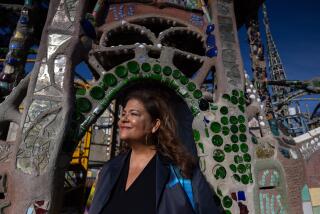Lillian Mobley dies at 81; South Los Angeles activist
Lillian Mobley, a prominent community activist who fought to establish and keep open the doors of Martin Luther King Jr./Drew Medical Center and pushed to create a companion medical school, has died. She was 81.
Mobley, who had been in failing health for the last few years, died Monday at Centinela Hospital Medical Center in Inglewood, said her son Kenneth.
She was “without a doubt the most accomplished and successful community activist South Los Angeles has ever had,” according to a statement by Rep. Maxine Waters (D-Los Angeles), whose district includes parts of the area.
As a voice for “poor people and working folks,” Mobley “articulated their pain, their challenges, their hopes and dreams,” Waters said.
After the 1965 Watts riots, Mobley was a key member of a driven group of women who pushed to build a major hospital in South Los Angeles as well as a medical school, the Charles R. Drew University of Medicine and Science. Mobley later fought to protect both.
“We would not be here without her contributions,” Dr. David M. Carlisle, the university’s recently appointed president, told The Times on Wednesday. “She was a nexus for the identification of health and healthcare challenges in South-Central Los Angeles.”
The college’s flag is being flown at half-staff in her honor until after Mobley’s memorial service July 29.
Although Mobley was sometimes labeled a Watts activist, her sphere of influence in Los Angeles was far wider. The Georgia native moved to L.A. in the 1950s and set out to make it better. She sat on numerous boards and advisory councils, giving input on matters as diverse as transportation and services for the elderly, education, healthcare and water rates.
“Something I enjoy is fighting for the rights of others,” she told The Times in 1977, the year she was part of California’s delegation to the National Women’s Conference.
The battle to save King/Drew in the South Los Angeles community of Willowbrook may have been Mobley’s toughest fight as an activist, and she was revered by many for her work.
A 2004 Times series on the troubles at King/Drew characterized Mobley as “long the hospital’s most visible defender”:
“Strong-willed and fiercely protective, Mobley, 74, is at the forefront of a coterie of African American leaders, most now in their 70s and 80s, who defend King/Drew with the same intensity that they once devoted to the civil rights movement. To them, it is part of the same struggle.”
That battle did not end the way Mobley and supporters had hoped; health officials closed the hospital in 2007 after it failed a critical federal inspection. The part of the facility that remains open is called the Martin Luther King Jr. Multi-Service Ambulatory Care Center.
Mobley also was instrumental in the creation in 1982 of King Drew Magnet High School of Medicine and Science in Willowbrook.
She had the ability to hush a crowd and rouse them at the same time. Even when she was silent, Mobley’s presence could be powerful.
Although she might not say much, Mobley would put “her life energy” into backing up “her words with actions,” sculptor Tina Allen told the Los Angeles Sentinel in 2002. The artist created a bronze bust of Mobley that has been displayed at the medical school.
In 1992, during the riots in the wake of the Rodney King verdict, Mobley scrupulously tended to residents’ needs. She was executive director of the South Central Multipurpose Senior Citizen Center and organized a food and clothing giveaway.
Mobley could be vitriolic in interviews, telling one reporter who called during the 1992 riots: “We do blessed wonderful things in this community. Now when the community is burning, people call me.”
As part of his attempt to understand the rage that fueled the unrest, filmmaker Randy Holland persuaded Mobley to be outfitted with a camera, which captured her work for his 1994 documentary “The Fire This Time.”
Mobley “just looked at me,” Holland told The Times in 1994, and said, “Somebody needs to tell the truth about what’s going on down here.”
Lillian Harkless was born March 29, 1930, in Macon, Ga., to Charlie and Corene Harkless and graduated from high school there in 1948. The same year, she married James Otis Mobley, and the couple moved to California in 1951.
Her activism began after she sent her children to school, according to her family.
Of her communal efforts to foster and attempt to keep a hospital where formerly there was none, she told The Times in 2009: “Every campaign we worked on was important.”
In addition to her husband, James, and son Kenneth, Mobley’s survivors include two other sons, Phillip and Charles; 10 grandchildren; 11 great-grandchildren; and three great-great-grandchildren. Her daughter, Corene, died in 2004.
Services will be held at 11 a.m. July 29 at Ward AME Church, 1177 25th St., Los Angeles.
Stewart is a former Times staff writer.
Times staff writer Valerie J. Nelson contributed to this report.
More to Read
Start your day right
Sign up for Essential California for the L.A. Times biggest news, features and recommendations in your inbox six days a week.
You may occasionally receive promotional content from the Los Angeles Times.




















































